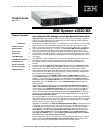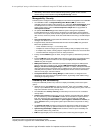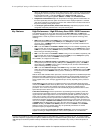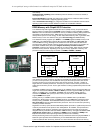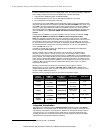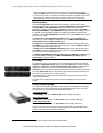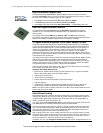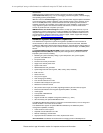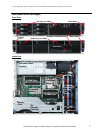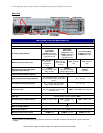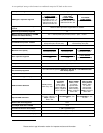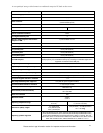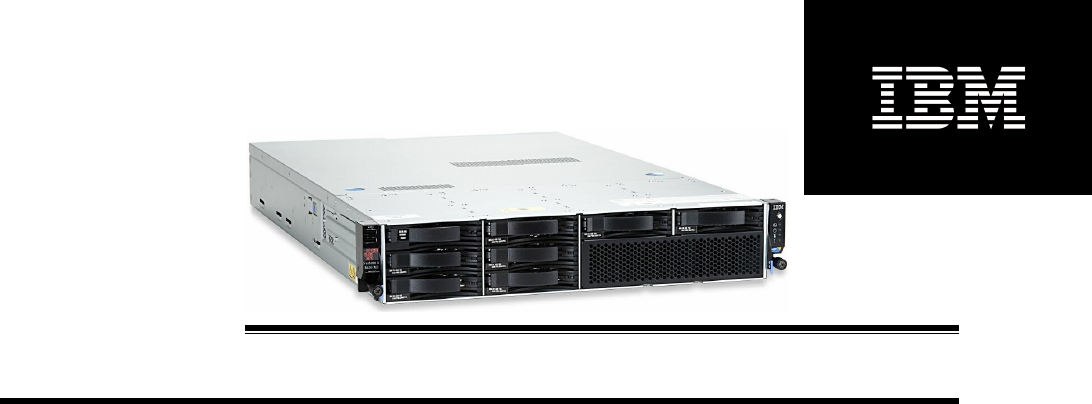
A cost-optimized storage-rich alternative to traditional enterprise 2U dual-socket servers
Please see the Legal Information section for important notices and information.
1
Product Guide
May 2010
IBM System x3620 M3
Product Overview
CONTENTS
Product Overview
1
Selling Features
2
Key Features
4
Key Options
11
x3620 M3 Images
13
x3620 M3 Specifications
14
The Bottom Line
17
Server Comparison
18
For More Information
19
Legal Information
19
Cost-effective 2U storage server packed with innovation
Suggested Uses: Departmental and file/print servers, online gaming, messaging, video/photo
sharing, email, transaction processing, blog hosting, and search engines; for large enterprise,
mid-market, SMBs, and emerging markets.
In today’s tough economic environment, your challenge is to do more with less—serve more Web
pages, handle more secure connections, support more e-mail users, and do it all on a tight
budget. You need to reduce the costs of doing business and improve the service you deliver to
your customers while lowering your overall risk. The dual-socket IBM
®
System x3620 M3 can
reduce your costs with its new energy-smart design and budget-conscious features. It can
improve service with reduced operational complexity and increased management functionality. It
can lower your IT risk with the resiliency that comes from hot-swap/redundant features. And like
all IBM servers, the x3620 M3 offers you the trust that comes from the IBM global reach, service
and support.
The x3620 M3 is a game-changing rack server that uses significantly less power than previous
generations, with unified systems management tools; high reliability, availability, and
serviceability features; and broad system flexibility, housed in a compact 2U mechanical
package.
The x3620 M3 features Intel
®
Xeon
®
5600 Series 6-core and 4-core, and 5500 Series 4-core
processors, with up to 12MB of shared L3 cache, to provide you with the computing power you
need to match your business needs and growth. The new line of Intel processors delivers
unprecedented intelligent performance with features like adaptive performance for applications
and environments, Turbo Boost Technology and Hyper-Threading Technology, and integrated
power gates and automated power management.
The x3620 M3 supports up to 12 DIMMs / 96GB of RDIMM 1333MHz DDR3 memory and
provides Chipkill
™
ECC (Error Checking and Correcting) protection—for high performance and
reliability. For even higher levels of availability, the x3620 M3 also offers memory mirroring.
Two integrated high-speed Gigabit Ethernet ports are included, as are three high-performance
PCIe adapter slots. The x3620 M3 offers an optional embedded hypervisor to manage your
virtual workloads.
Some System x3620 M3 models support up to 8 hot-swap 3.5-inch Serial-Attached SCSI
(SAS) or Serial-Attached ATA (SATA) HDDs with an internal storage capacity of 16TB. Other
models support up to 4 simple-swap SATA drives, with a storage capacity of up to 8TB. The
server includes firmware RAID-0/1 standard, and offers a choice of several IBM ServeRAID
®
storage controllers that provide broad levels of hardware-based RAID solutions. To meet your
backup needs, the x3620 M3 supports a choice of internal tape drives, as well as the internal
RDX Removable Disk Backup System.
The ultra-dense 2U form factor allows businesses to increase their computing power and spread
their workload without outgrowing their current data center. Up to 21 of these 2U servers can be
installed in a single 42U rack, for a total of up to 42 processors, 252 processor cores (and 504
threads), offering tremendous deployment flexibility.
Standard in the x3620 M3 is the Integrated Management Module (IMM) that enables the user to
manage and control the server easily—both locally and remotely. The IMM offers a high level of
manageability that is designed to keep costs down and the system up—even when network
usage increases. The IMM helps maximize network availability by increasing uptime, as do
Active Memory
™
protection, hot-swap/redundant SAS or SATA HDDs, hot-swap/redundant
ultra-efficient power supplies and redundant fan modules; integrated RAID; temperature-
controlled fans; IPMI 2.0 support, including highly secure remote power control and Serial
over LAN; as well as text-console redirect over LAN.
Another improvement with the new generation of X-Architecture is the replacement of old BIOS
with a new generation United Extensible Firmware Interface (UEFI). UEFI provides a more
intuitive user interface and understandable event logs and better management.



